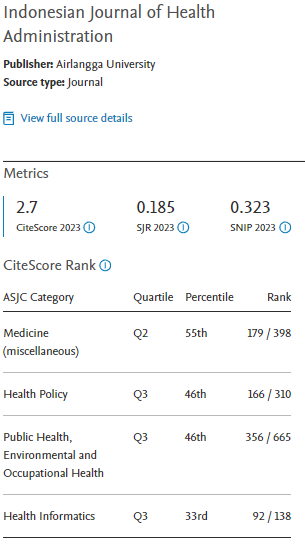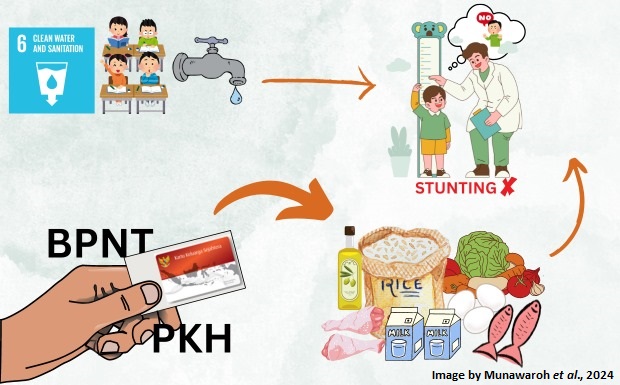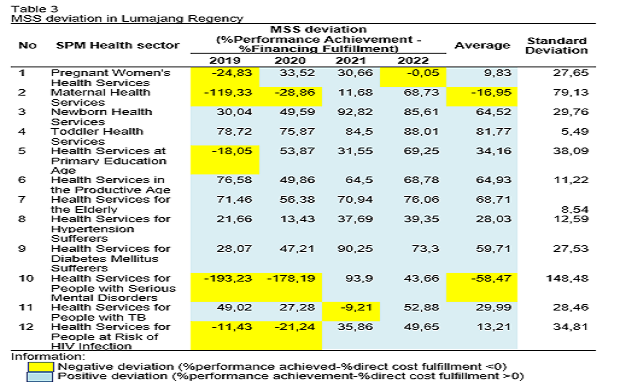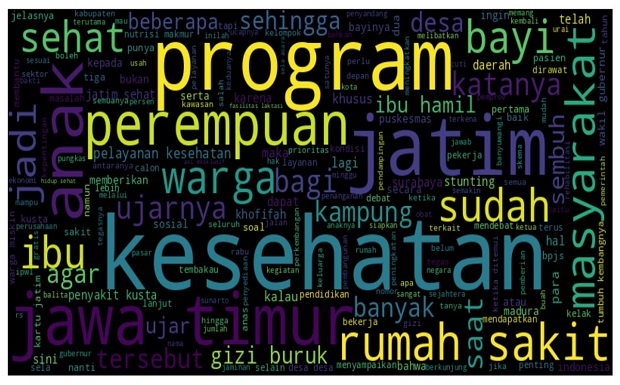COMMUNITY KNOWLEDGE, ATTITUDES, AND BEHAVIOR TOWARDS SOCIAL DISTANCING POLICY AS PREVENTION TRANSMISSION OF COVID-19 IN INDONESIA
Downloads
Background: Coronavirus Disease 2019 (COVID-19) caused by SARS-CoV2 recently became a pandemic worldwide, such as in Indonesia. Social distancing is one of the recommended mitigations to reduce the risk of disasters, such as morbidity and mortality caused by COVID-19. Community compliance with social distancing is a part of the pandemic control.
Aims: This study identified knowledge, attitudes, and behavior towards the prevention of SARS-CoV-2 transmission through social distancing during COVID-19 pandemic among Indonesian community.
Methods: This descriptive study applied a cross-sectional design and distributed closed questions with online questionnaire randomly to 34 provinces in Indonesia on social media networks and e-mail. This study successfully collected 1,102 respondents from 29 provinces in Indonesia. The data were analyzed descriptively by calculating frequency, percentage, and cross-tabulation.
Results: This study had successfully identified 99%, 59%, and 93% of respondents with good knowledge, positive attitudes, and good behavior respectively towards social distancing. Among the respondents who had good knowledge showed positive attitudes (58.85%) and good behavior (93.3%). The respondents who had positive attitudes showed good behavior (96.7%).
Conclusion: Indonesian community had good knowledge, attitude and behavior towards social distancing as a way to prevent the virus transmission. This strongly supports disaster mitigation in controlling the COVID-19 pandemic in Indonesia.
Keywords: attitudes, behavior, COVID-19, knowledge, social distancing.
Ahmadi (2013) Kesehatan Masyarakat, teori dan aplikasi. Jakarta: Raja Grafindo.
Ahmed, F., Zviedrite, N. and Uzicanin, A. (2018) ‘Effectiveness of workplace social distancing measures in reducing influenza transmission: A systematic review', BMC Public Health. BMC Public Health, 18(518), pp. 1–13. doi: 10.1186/s12889-018-5446-1.
Ajzen, I. (2002) ‘Perceived Behavioral Control, Self-Efficacy, Locus of Control, and the Theory of Planned Behavior', Journal of Applied Social Psychology, 32(4), pp. 665–683. doi: 10.1111/j.1559-1816.2002.tb00236.x.
Albarracin, D. et al. (2001) ‘Theories of reasoned action and planned behavior as models of condom use: A meta-analysis.', Psychological bulletin, 127(1), pp. 142–161. doi: 10.1037/0033-2909.127.1.142.
American Library Association (2020) Covid-19 Corona Virus Pandemic, Worldometer. Available at: https://www.worldometers.info/coronavirus/?utm_campaign=homeAdvegas1?%22 (Accessed: 9 April 2020).
Anwar, S. (1988) Sikap Manusia dan Pegukurannya. Yogyakarta: Liberty.
Bandura, C. E. (1986) Social foundations of thought and action. London: SAGE publication.
Barley, E. and Lawson, V. (2016) ‘Using Health Psychology to Help Patients: Theories of Behaviour Change', British Journal of Nursing, 25(16), pp. 924–927.
Bedford, J. et al. (2020) ‘COVID-19: towards controlling of a pandemic', The Lancet, 395(10229), pp. 1015–1018. doi: 10.1016/S0140-6736(20)30673-5.
Chaiklin, H. (2011) ‘Attitudes , Behavior , and Social Practice', The Journal of Sociology & Social Welfare, 38(1), pp. 31–54.
Cowell, A. J. (2006) ‘The relationship between education and health behavior: Some empirical evidence', Health Economics, 15(2), pp. 125–146. doi: 10.1002/hec.1019.
Darker, C. D. et al. (2010) ‘An intervention to promote walking amongst the general population based on an "extended” theory of planned behaviour: a waiting list randomised controlled trial.', Psychology & health, 25(1), pp. 71–88. doi: 10.1080/08870440902893716.
Ferreira, G. and Pereira, M. G. (2017) ‘Physical activity: The importance of the extended theory of planned behavior, in type 2 Diabetes patients.', Journal of health psychology, 22(10), pp. 1312–1321. doi: 10.1177/1359105315626787.
Glass, R. J. et al. (2006) ‘Targeted social distancing design for pandemic influenza', Emerging Infectious Diseases, 12(11), pp. 1671–1681. doi: 10.3201/eid1211.060255.
Guan, W. J., Chen, R. C. and Zhong, N. S. (2020) ‘Strategies for the prevention and management of coronavirus disease 2019', The European respiratory journal, 55(4). doi: 10.1183/13993003.00597-2020.
Guo, Y. R. et al. (2020) ‘The origin, transmission and clinical therapies on coronavirus disease 2019 (COVID-19) outbreak - an update on the status', Military Medical Research. Military Medical Research, 7(11), pp. 1–10. doi: 10.1186/s40779-020-00240-0.
Herman, H. et al. (2015) ‘The Community Disease Prevention Behaviors in District Maros South Sulawesi Province', International Education Studies, 8(11), pp. 104–112. doi: 10.5539/ies.v8n11p104.
Hoffmann, M. et al. (2020) ‘SARS-CoV-2 Cell Entry Depends on ACE2 and TMPRSS2 and Is Blocked by a Clinically Proven Protease Inhibitor', Cell, 181(2), pp. 1–10. doi: 10.1016/j.cell.2020.02.052.
Huda, N. et al. (2012) ‘The Analysis of Attitudes , Subjective Norms , and Behavioral Control on Muzakki ' s Intention to Pay Zakah', International Journal of Business and Social Science, 3(22), pp. 271–279.
Jannuzzi, F. F. et al. (2020) ‘Psychosocial determinants of adherence to oral antidiabetic medication among people with type 2 diabetes.', Journal of clinical nursing, 29(5–6), pp. 909–921. doi: 10.1111/jocn.15149.
Kapur, R. (2018) Impact of Culture on Education. Available at: https://www.researchgate.net/publication/323794724_Impact_of_Culture_on_Education.
Kast, F. and Rosenzweig, J. (2003) Orgnasisi dan manajemen. 4th edn. Jakarta: Bumi Aksara.
Kelso, J. K., Milne, G. J. and Kelly, H. (2009) ‘Simulation suggests that rapid activation of social distancing can arrest epidemic development due to a novel strain of influenza', BMC Public Health, 9(117), pp. 1–10. doi: 10.1186/1471-2458-9-117.
Lewnard, J. A. and Lo, N. C. (2020) ‘Scientific and ethical basis for social-distancing interventions against COVID-19', The Lancet Infectious Diseases. Elsevier Ltd, 3099(20), pp. 1–2. doi: 10.1016/s1473-3099(20)30190-0.
Li, X. et al. (2020) ‘Molecular immune pathogenesis and diagnosis of COVID-19', Journal of Pharmaceutical Analysis. Elsevier Ltd, 10(2), pp. 102–108. doi: 10.1016/j.jpha.2020.03.001.
Liu, L. et al. (2016) ‘Use of a knowledge-attitude-behaviour education programme for Chinese adults undergoing maintenance haemodialysis: Randomized controlled trial', The Journal of international medical research. 2016/03/07. SAGE Publications, 44(3), pp. 557–568. doi: 10.1177/0300060515604980.
Maharaj, S. and Kleczkowski, A. (2012) ‘Controlling epidemic spread by social distancing: do it well or not at all.', BMC public health, 12(679), pp. 1–16. doi: 10.1186/1471-2458-12-679.
Notoatmodjo, S. (2012) Promosi Kesehatan dan Perilaku Kesehatan. jakarta: Rineka Cipta.
Pawelek, K. A., Salmeron, C. and Valle, S. Del (2015) ‘Connecting within and between-hosts dynamics in the influenza infection-staged epidemiological models with behavior change', Journal of Coupled Systems and Multiscale Dynamics, 3(3), pp. 233–243. doi: 10.1166/jcsmd.2015.1082.
Prompetchara, E., Ketloy, C. and Palaga, T. (2020) ‘Immune responses in COVID-19 and potential vaccines: Lessons learned from SARS and MERS epidemic', Asian Pacific journal of allergy and immunology, 38(1), pp. 1–9. doi: 10.12932/AP-200220-0772.
Reluga, T. C. (2010) ‘Game theory of social distancing in response to an epidemic', PLoS Computational Biology, 6(5), pp. 1–9. doi: 10.1371/journal.pcbi.1000793.
Robbins, S. P. (2007) Perilaku Organisasi. Jakarta: Salemba Empat.
Robinson, J. G. et al. (2009) ‘Attitudes About Health and Health-Related Behaviors in Patients With Cardiovascular Disease or at Elevated Risk for Cardiovascular Disease', Preventive Cardiology, 12(3), pp. 136–143. doi: 10.1111/j.1751-7141.2009.00037.x.
Saifulloh, M. (2020) Nafsu Mudik Dini ditengah Pandemic Corona. Available at: https://www.okezone.com/tren/read/2020/03/27/620/2190127/nafsu-mudik-dini-di-tengah-pandemi-virus-corona (Accessed: 23 April 2020).
Saunders-Hastings, P. R. and Krewski, D. (2016) ‘Reviewing the history of pandemic influenza: Understanding patterns of emergence and transmission', Pathogens, 5(4), pp. 1–19. doi: 10.3390/pathogens5040066.
Thurstone, L. L. (1928). ‘Attitudes can be measured', American Journal of Sociology, 33, pp. 529–554.
Copyright (c) 2020 budi yanti, budi yanti

This work is licensed under a Creative Commons Attribution-ShareAlike 4.0 International License.
1. As an author you (or your employer or institution) may do the following:
- make copies (print or electronic) of the article for your own personal use, including for your own classroom teaching use;
- make copies and distribute such copies (including through e-mail) of the article to research colleagues, for the personal use by such colleagues (but not commercially or systematically, e.g. via an e-mail list or list server);
- present the article at a meeting or conference and to distribute copies of the article to the delegates attending such meeting;
- for your employer, if the article is a ‘work for hire', made within the scope of your employment, your employer may use all or part of the information in the article for other intra-company use (e.g. training);
- retain patent and trademark rights and rights to any process, procedure, or article of manufacture described in the article;
- include the article in full or in part in a thesis or dissertation (provided that this is not to be published commercially);
- use the article or any part thereof in a printed compilation of your works, such as collected writings or lecture notes (subsequent to publication of the article in the journal); and prepare other derivative works, to extend the article into book-length form, or to otherwise re-use portions or excerpts in other works, with full acknowledgement of its original publication in the journal;
- may reproduce or authorize others to reproduce the article, material extracted from the article, or derivative works for the author's personal use or for company use, provided that the source and the copyright notice are indicated.
All copies, print or electronic, or other use of the paper or article must include the appropriate bibliographic citation for the article's publication in the journal.
2. Requests from third parties
Although authors are permitted to re-use all or portions of the article in other works, this does not include granting third-party requests for reprinting, republishing, or other types of re-use.
3. Author Online Use
- Personal Servers. Authors and/or their employers shall have the right to post the accepted version of articles pre-print version of the article, or revised personal version of the final text of the article (to reflect changes made in the peer review and editing process) on their own personal servers or the servers of their institutions or employers without permission from JAKI;
- Classroom or Internal Training Use. An author is expressly permitted to post any portion of the accepted version of his/her own articles on the author's personal web site or the servers of the author's institution or company in connection with the author's teaching, training, or work responsibilities, provided that the appropriate copyright, credit, and reuse notices appear prominently with the posted material. Examples of permitted uses are lecture materials, course packs, e-reserves, conference presentations, or in-house training courses;























